
Online Journal of Communication and Media Technologies
Scope & Guideline
Transforming Ideas into Impactful Research in Communication
Introduction
Aims and Scopes
- Digital Communication and Media Studies:
The journal publishes research on various aspects of digital communication, including the role of social media, online engagement, and digital content creation, highlighting how these elements shape public discourse and individual behavior. - Impact of Technology on Society:
It explores how technological advancements, particularly in communication technologies, influence social interactions, public opinion, and the dissemination of information. - Education and Technology Integration:
Research on the integration of technology in educational settings is a key focus, examining how digital tools enhance learning experiences, promote engagement, and address challenges in education. - Health Communication:
The journal addresses health communication strategies, particularly during crises like the COVID-19 pandemic, analyzing the role of media in shaping health behaviors and public understanding. - Cultural and Social Dynamics:
It investigates how communication and media technologies affect cultural narratives, social movements, and the development of identity in diverse contexts. - Methodological Innovations:
The journal encourages methodological diversity, including quantitative, qualitative, and mixed methods, to address complex communication phenomena.
Trending and Emerging
- Artificial Intelligence in Communication:
Research on the implications of artificial intelligence, such as ChatGPT, in communication practices is on the rise, exploring its potential to transform educational methods, enhance user engagement, and impact mental health. - Cybersecurity and Digital Ethics:
There is an increasing focus on cybersecurity issues related to digital communication, emphasizing the need for awareness and ethical considerations in online interactions. - Social Media's Role in Crisis Communication:
The journal is increasingly publishing studies that examine social media's effectiveness in crisis communication, particularly during global events like the COVID-19 pandemic, highlighting its role in shaping public responses. - Mental Health and Social Media:
Research examining the relationship between social media use and mental health is trending, exploring both positive and negative impacts, including issues like cyberbullying and online support systems. - Gamification and Learning Technologies:
The integration of gamification strategies in educational contexts is gaining attention, focusing on how these methods can enhance engagement and learning outcomes in digital environments. - Cultural Communication in Digital Spaces:
There is a growing interest in how digital platforms facilitate cultural communication and identity formation, exploring the impact of social media on global cultural exchanges.
Declining or Waning
- Traditional Media Analysis:
Research focusing on traditional media formats, such as print newspapers and broadcast television, has seen a decline as scholars increasingly prioritize digital and social media platforms. - Static Communication Models:
There is a noticeable reduction in studies centered on static communication models that do not account for the dynamic nature of digital interactions, as researchers seek more nuanced frameworks that reflect real-time communication. - Generic Health Communication Strategies:
Studies centered around broad health communication strategies without specific contextual or technological considerations are becoming less frequent, as the field shifts to more specialized and technology-driven analyses. - Historical Media Studies:
Research that primarily focuses on historical perspectives of media without linking them to contemporary issues or technological advancements appears to be waning, indicating a preference for relevance to current trends. - Niche Topics in Communication:
Certain niche topics, such as very localized media studies or specific demographic analyses that previously garnered attention, are becoming less prevalent as the journal's scope broadens to encompass more global and impactful themes.
Similar Journals
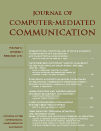
Journal of Computer-Mediated Communication
Fostering Academic Engagement in the Age of ConnectivityThe Journal of Computer-Mediated Communication, published by Oxford University Press, stands as a premier platform for scholarly discourse in the fields of Communication, Computer Networks and Communications, and Computer Science Applications. Since its inception in 1995, this Open Access journal has provided invaluable insights into the evolving dynamics of human interaction through digital mediums. The journal has garnered an impressive reputation, evidenced by its Q1 ranking in multiple categories and a remarkable Scopus rank of #22 out of 511 in the Communication field, placing it in the 95th percentile. Covering diverse topics up to 2024, it is essential for researchers, professionals, and students alike seeking to explore the intersections of technology and communication. With its commitment to advancing knowledge and fostering academic engagement, the Journal of Computer-Mediated Communication is pivotal for anyone invested in understanding the profound impact of technology on social interaction.
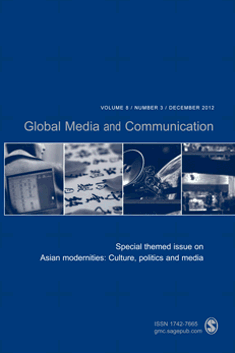
Global Media and Communication
Innovating Research at the Intersection of Media and SocietyGlobal Media and Communication is a premier journal dedicated to advancing the fields of media and communication studies, published by SAGE Publications Ltd. With an ISSN of 1742-7665 and an E-ISSN of 1742-7673, this journal offers a platform for scholarly discourse and innovative research that explores the intricate relationships between global media practices and communication strategies. Recognized as a Q1 journal in both the Arts and Humanities (Miscellaneous) and Communication categories for 2023, it stands out in its commitment to delivering high-quality, peer-reviewed articles that contribute to the understanding of contemporary media landscapes. Located in London, United Kingdom, the journal benefits from being at the heart of cultural and digital innovation. Researchers, professionals, and students can look forward to insightful articles that not only critique existing frameworks but also propose new methodologies, ensuring that Global Media and Communication remains a vital resource for anyone interested in navigating the evolving dynamics of media and communication on a global scale.

Comunicacion y Sociedad-Guadalajara
Exploring critical discourse in the heart of Mexico.Comunicacion y Sociedad-Guadalajara is a distinguished peer-reviewed journal published by UNIV GUADALAJARA that plays a vital role in the field of communication studies. With an ISSN of 0188-252X and an E-ISSN of 2448-9042, this journal has embraced Open Access since 2023, ensuring that groundbreaking research is accessible to a wider audience. Hailing from Mexico, it serves as a platform for innovative research and critical discourse in communication, ranking Q2 in the Communication category and securing a notable Scopus rank of #[232/511, positioning it within the top 54th percentile of its field. Covering converged years from 2009 to 2010 and from 2013 to 2024, the journal's objective is to foster scholarly dialogue and advance knowledge across diverse aspects of communication. With a commitment to excellence, Comunicacion y Sociedad-Guadalajara stands as an essential resource for researchers, professionals, and students seeking to engage with contemporary issues in communication.
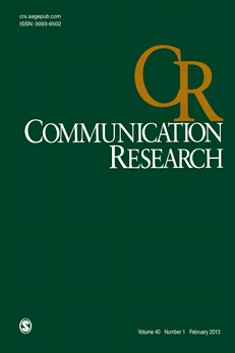
COMMUNICATION RESEARCH
Advancing the Frontiers of Communication Science.COMMUNICATION RESEARCH, published by SAGE Publications Inc, stands as a premier journal in the fields of Communication and Linguistics, boasting an impressive impact factor that reflects its influential contributions to academic scholarship. Since its inception in 1974, this esteemed journal has provided rigorous, peer-reviewed research that delves into the dynamics of human communication, making it a vital resource for researchers, practitioners, and students alike. With a commendable ranking within the Q1 category for both Communication and Linguistics and consistently placed within the 99th percentile across Scopus ranks, COMMUNICATION RESEARCH is at the forefront of academic inquiry, fostering a deeper understanding of communication processes in diverse contexts. While not an Open Access journal, it offers extensive access options facilitating widespread dissemination of knowledge. Researchers can look forward to an engaging array of cutting-edge studies and theoretical advancements in forthcoming issues, making it an indispensable tool for those studying the complexities of language and communication.
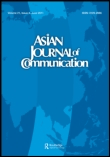
Asian Journal of Communication
Exploring Interdisciplinary Perspectives in CommunicationThe Asian Journal of Communication, published by Routledge Journals, Taylor & Francis Ltd, is a premier scholarly platform dedicated to advancing the field of communication studies. Established in 1990 and continuing its impactful publication journey through 2024, this esteemed journal caters to a broad spectrum of interdisciplinary research, addressing critical issues in communication, media, and education in an Asian context. With an impressive impact factor and ranked in the top quartiles in both Communication (Q1) and Education (Q2), the journal is recognized for its rigorous peer-review process and its commitment to quality scholarship. Researchers, professionals, and students can access invaluable insights and innovative research trends, helping to bridge gaps and foster understanding across diverse communication practices. The journal is accessible through institutional subscriptions and promotes global discourse, making it an essential resource for anyone engaged in the vibrant field of communication.
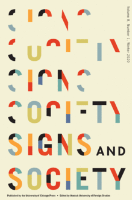
Signs and Society
Transforming Understanding of Communication PracticesSigns and Society is an acclaimed academic journal published by University of Chicago Press, specializing in the interdisciplinary exploration of semiotics, cultural representations, and communication practices. With an impressive ISSN of 2326-4489 and E-ISSN 2326-4497, this journal has established itself as a credible source of research and insight within its fields. It operates under a robust framework with a convergence of topics from 2015 to 2024, and has achieved notable rankings, including Q1 placements in Cultural Studies, Linguistics and Language, and Visual Arts and Performing Arts in 2023, elevating it to a leading status among its peers. The journal’s impact is reflected in its Scopus rankings, positioning it in high percentiles across diverse categories, making it a vital resource for scholars, practitioners, and students interested in the intricate relationships between signs, society, and culture. Although not an open access publication, Signs and Society remains essential for those seeking to deepen their understanding of communication dynamics and the multifaceted dimensions of cultural expression.
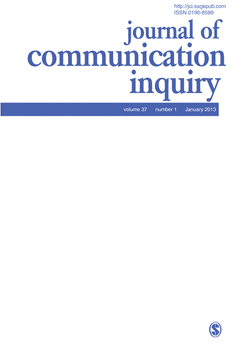
Journal of Communication Inquiry
Exploring the Dynamics of Communication and CultureJournal of Communication Inquiry, published by SAGE PUBLICATIONS INC, is a premier interdisciplinary journal that serves as a vital platform for scholars and practitioners in the fields of communication, cultural studies, and the arts and humanities. With a rich history dating back to its inception in 1974, the journal has consistently upheld rigorous academic standards, reflected in its impressive rankings within the Q1 and Q2 quartiles across various disciplines according to the latest metrics. The journal's comprehensive scope encompasses theoretical and empirical research, catering to a diverse readership who are keen to explore contemporary communication issues and cultural dynamics. While the impact factor is not explicitly stated, the journal's Scopus ranks position it favorably within its categories, with notable percentiles that highlight its influence in the academic community. As an essential resource for researchers, professionals, and students alike, the Journal of Communication Inquiry invites contributions that advance the discourse surrounding communication practices and cultural phenomena, contributing to the ongoing dialogue in these evolving fields.

Vivat Academia
Advancing Knowledge, Inspiring Change.Vivat Academia is a prestigious peer-reviewed journal dedicated to advancing knowledge and scholarly discourse in the fields of education and social sciences. Published by FORUM XXI, this journal has been an open access platform since 1991, promoting unrestricted access to research that fosters understanding and innovation in academia. With its ISSN 1575-2844, Vivat Academia provides researchers, professionals, and students with a robust repository of original articles, reviews, and case studies. By facilitating discussions and sharing insights on contemporary education practices and social dynamics, it remains an invaluable resource for those seeking to influence policy and pedagogical approaches. Registered at CALLE CINE 38 BAJO DERECHA, MADRID 28024, SPAIN, this journal exemplifies the commitment to fostering an inclusive and progressive academic community, ensuring that valuable research reaches a global audience.
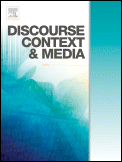
Discourse Context & Media
Connecting Ideas Through Contextual Discourse and MediaDiscourse Context & Media is a leading peer-reviewed journal published by ELSEVIER SCI LTD that focuses on the dynamic interplay between discourse, context, and media. With an ISSN of 2211-6958 and an E-ISSN of 2211-6966, this journal has established itself as a vital resource in the fields of Communication and Cultural Studies, achieving a remarkable ranking within the top quartile (Q1) as per the latest evaluations. Its Scopus ranks highlight its prominence, placing it 36th out of 1304 in Cultural Studies (97th percentile) and 71st out of 511 in Communication (86th percentile). As an open access journal based in the Netherlands, it invites researchers, professionals, and students to contribute to and engage with contemporary discussions surrounding the influence and implications of discourse in various media contexts. The journal's scope extends from 2012 to 2024, promising to reflect ongoing developments within the field and support a vibrant academic dialogue.

Review of Communication Research
Exploring the Dynamics of Modern CommunicationReview of Communication Research is a prestigious open-access journal dedicated to advancing the field of communication studies. Published by REVIEW COMMUNICATION RESEARCH from its base in Madrid, Spain, this journal has established itself as a vital platform for scholarly discourse since its inception. With an impressive impact factor and ranked in the Q1 quartile of communication journals for 2023, it holds a commendable position, placing it within the top 13% of approximately 511 journals in the communication category on Scopus. Since becoming open-access in 2013, the journal has enabled researchers, professionals, and students to access high-quality research without financial barriers, thereby fostering a greater dissemination of knowledge and dialogue within the community. Covering a wide array of topics from communication theory to media studies, the Review of Communication Research continues to contribute significantly to the understanding and evolution of communication in today’s interconnected world. Researchers are encouraged to engage with and submit their findings to this influential journal to further enrich the scholarly landscape.